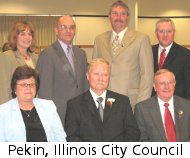Article from: www.thenewspaper.com/news/27/2790.asp
5/28/2009
Illinois: Little City Brings in Big Cash from Towing
Six months of towing cars for the alleged crimes of passengers boosted police revenue 29 percent in Pekin, Illinois.
 Vehicle owners could lose their car when passing through Pekin, Illinois if a passenger happens to be carrying something on the city's list of contraband. On Tuesday, the Pekin City Council agreed to tinker with its controversial automobile towing ordinance that has boosted the police department's annual revenue by 29 percent. It has also generated opposition from local residents like Ed Emmons who is circulating a petition calling for reform.
Vehicle owners could lose their car when passing through Pekin, Illinois if a passenger happens to be carrying something on the city's list of contraband. On Tuesday, the Pekin City Council agreed to tinker with its controversial automobile towing ordinance that has boosted the police department's annual revenue by 29 percent. It has also generated opposition from local residents like Ed Emmons who is circulating a petition calling for reform.
"The city saw a new way to make money and ran with the idea," Emmons wrote in March. "The council should do what the majority of their constituents wish abolish the new vehicle impound ordinance."
The ordinance, which took effect last May, allows a police officer to seize any car by claiming he has "probable cause" to believe the driver or any passenger possesses "a controlled substance or drug paraphernalia." It also allows seizure in cases of drunk driving and driving with an expired license. The owner of the vehicle must pay the city a $500 fine, plus towing and storage fees that mount while waiting 72 hours -- not counting weekends and holidays -- for a city-paid hearing examiner to determine guilt.
"The formal rules of evidence will not apply at the hearing, and hearsay testimony
will be allowed, and will be admissible," the ordinance explains. "If the hearing officer determines that the vehicle was not used as hereinabove provided, the motor vehicle will be returned to the owner of record of the vehicle without any penalty or other costs, other than the cost of towing and storage."
The ordinance gained attention when Mary Worrick filed suit over the impounding of her car in August. Pekin Police Officer Jeff Stoltz allegedly spotted Worrick's son, Anthony Myers, 19, stopping over the white line in the car at an intersection. Stoltz initiated a traffic stop which allowed him to search the vehicle with a drug dog. Stoltz soon found a bong belonging to a sixteen-year-old backseat passenger. Stoltz ordered the car impounded, even though there was no evidence that Myers or Worrick knew anything about the illegal device. Myers was not even given a traffic ticket, but the car was taken.
While drug pipes are the most obvious examples of an item that could trigger impoundment, the Illinois Code defines "drug paraphernalia" so loosely that probable cause could be cited in the cases of a car carrying relatively common household items. The city of Burlington, Iowa provides a more explicit list that is consistent with the Illinois state code's definition of paraphernalia.
"It includes, but is not limited to: Scales and balances used, intended for use, or designed for use in weighing or measuring controlled substances... dextrose or lactose... blenders, bowls, containers, spoons and mixing devices... capsules, balloons, envelopes and other containers," Burlington City Code 53.03 states.
In just the first six months that the impounding ordinance was active, Pekin police collected $124,420 in revenue from towing. This represented the second greatest source of revenue next to traffic tickets, which generated $306,265 in 2008. Parking tickets generated only $40,990 in the city of 34,000.
A copy of the Pekin ordinance is available in a 20k PDF file at the source link below.
Source: Ordinance Number 2559 (City of Pekin, Illinois, 5/27/2009)
Permanent Link for this item
Return to Front Page
 Vehicle owners could lose their car when passing through Pekin, Illinois if a passenger happens to be carrying something on the city's list of contraband. On Tuesday, the Pekin City Council agreed to tinker with its controversial automobile towing ordinance that has boosted the police department's annual revenue by 29 percent. It has also generated opposition from local residents like Ed Emmons who is circulating a petition calling for reform.
Vehicle owners could lose their car when passing through Pekin, Illinois if a passenger happens to be carrying something on the city's list of contraband. On Tuesday, the Pekin City Council agreed to tinker with its controversial automobile towing ordinance that has boosted the police department's annual revenue by 29 percent. It has also generated opposition from local residents like Ed Emmons who is circulating a petition calling for reform.